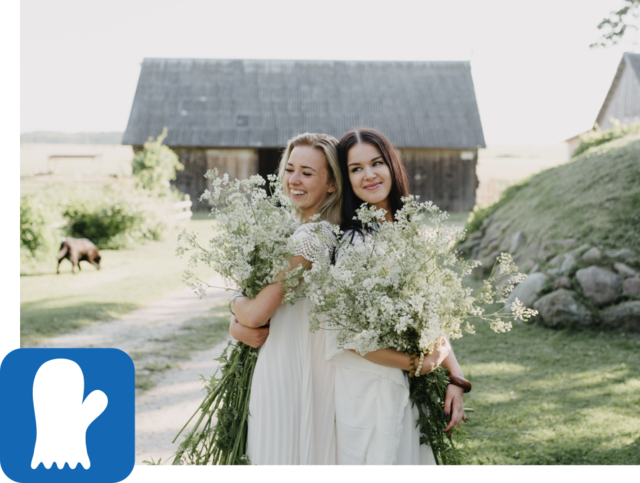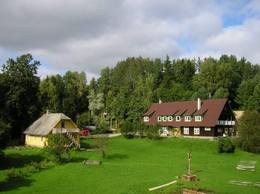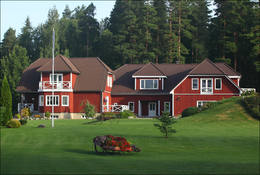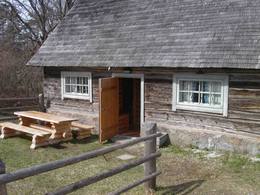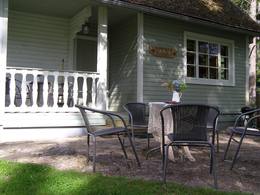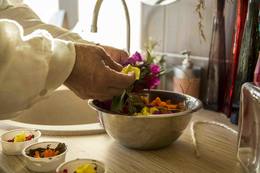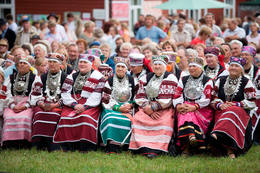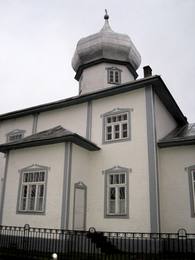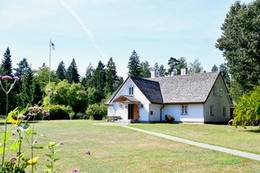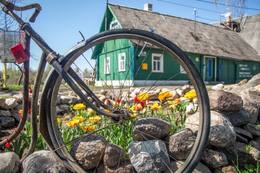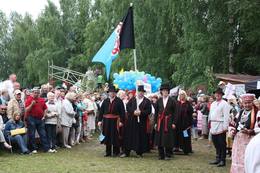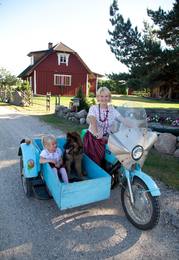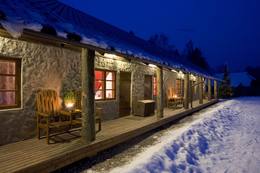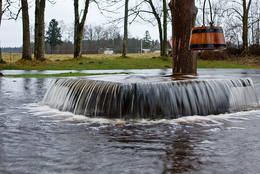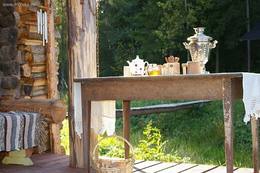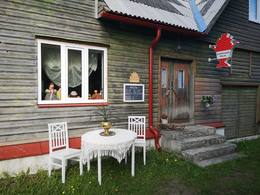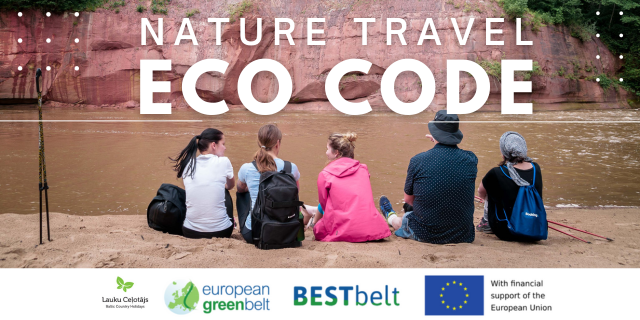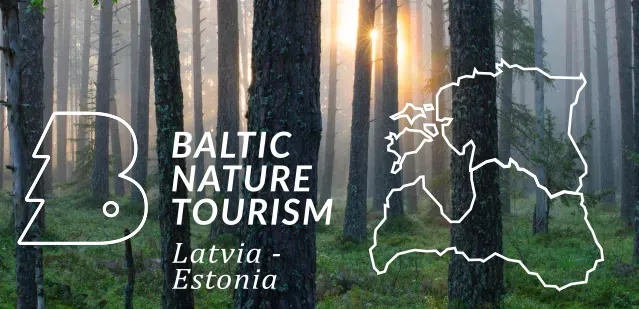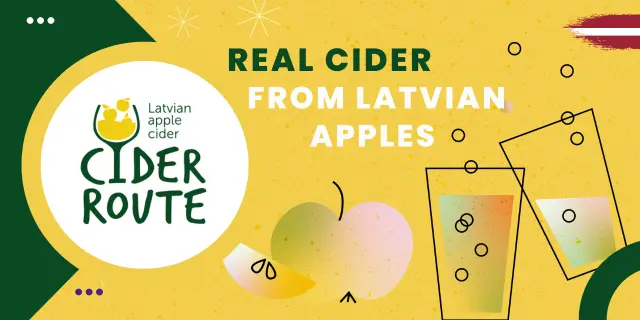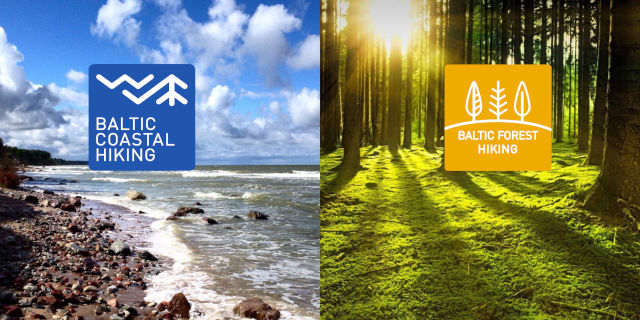
Rural Lifestyle
The "Rural Lifestyle" offer allows tourists to learn about rural lives and people, finding new tourism destinations which have their own identity. This is a story about lifestyles which changes accustomed ideas about the countrywide and establishes a new rural environment in which traditional and modern values can be merged. Guests can learn about life in small towns, farms and companies together with local residents. You can watch and become involved in everyday processes such as gardening, modern design craftsmanship, healthy food, the manufacturing of innovative products, architecture and the environment, a green lifestyle and many other true values.
>>> Rural Lifestyle project web page:
gorural.countryholidays.info
>>> MAP - “Rural Lifestyle” farms
>>> "Rural Lifestyle" events
Here is a list of farms which offer "Rural Lifestyle" experiences to visitors (In Latvia and Estonia). The programme description includes information about the destination and the location of the farm. There will be information about the family at the farm and its history, with the programme also being described via activities. You absolutely must contact the farm in advance, because not all of them offer tourist services, instead working with manufacturing or other activities. Such farms usually set special times and/or days when they are prepared to receive visitors. The duration of the program and the number of people also need to be agreed in advance with the hosts.
| Обзор | Подробности |
|---|---|
|
Эстония
от 44 LVL / DBL
PesaProgramme:
|
|
|
Эстония
от 16,50 LVL / B&B
KIIDIThe camp activities include:
|
|
|
Эстония
Центр отдыха и проведения семинаров Klaara-ManniDer Standort liegt unweit der Grenze des Soomaa-Nationalparks und des Gemeindezentrums Tori. Auf der großzügigen Anlage des Gästehauses Klaara-Manni steht eine traditionelle estnische Sauna, umgeben von einem großen und schönen Bio-Garten. Die uralte Kultur der Sauna lässt sich nur durch echte Saunaerlebnisse verstehen und genießen. Das Landfrauen-Wellness-Programm beinhaltet ein belebendes Saunabad, das den Körper in Schwung bringt. Das Landfrauen-Saunavergnügen mit echten estnischen Saunatraditionen ist zwar in erster Linie für Frauen gedacht, aber ebenso gut für Männer geeignet. Das Landfrauen-Wellness-Programm ist der Name eines Saunabesuchs, bei dem die Teilnehmerinnen die Charakteristik, die Beschaffenheit und die Traditionen der Sauna kennenlernen. Der Saunagang wird von der Gastgeberin oder dem Gastgeber geleitet, die im täglichen Leben Biobauern sind und einen Lebensstil pflegen, der im Einklang mit der Natur steht. Während der Saunagänge geben sie ihr Wissen über die Heilkraft der Sauna und die der Natur an die Gäste weiter. Dabei erfahren die Teilnehmer, wie die Menschen einst auf sich und ihre Gesundheit achtgaben und durch das Saunieren Kraft für Körper und Seele erhielten. Die Sitzungen finden im Wald, auf dem Hof und in der holzbeheizten Sauna statt. PROGRAMM:
|
|
|
Эстония
TOOMARAHVAProgramme: Day 1:
Day 2:
|
|
|
Эстония
Holiday home "Kärka"Estonia is a maritime country where coastal fishing has a long tradition and is part of the history of the Estonian coastal people. Scenic fishing villages Kaberneeme Salmistu, Purekari and Viinistu in Lahemaa region are located in the area that is the best for fishing sea trout and boasts the biggest fish. The host of the programme is Lahemaa Kalaturism – the local fishing association and their main goal is the propagation of sustainable fishing and educating new fishing guides. Timo, the fishing guide, is well known in Estonia and probably one of the best sea trout catchers in the area. Rain Käärst, the chef, will cook the dinner together with guests, and Signe Bloom will take care of the cosy atmosphere in the holiday house. The Fishing tour takes guests to fishing sites, the choice of which will be selected on the morning of the tour depending on the weather conditions, wind and currents. The fishing sites are 10-30 km from the guest house. Guests are picked up in the morning and guided in fishing until the end of the day. The package includes snacks and refreshments throughout the fishing day. The day ends with a delicious dinner of grilled fish and local specialities, cooked under the guidance of the chef, followed by a country sauna in the holiday house. PROGRAMME: Day 1.
Day 2.
|
|
|
Эстония
Хозяйство ENERGIADer Ferienhof Energia Talu (Energiefarm) liegt im südlichen Teil Estlands. Es handelt sich um ein Heilpflanzenzentrum mit einem eigenen Teehaus. Alle Kräuter auf dem Hof werden biologisch angebaut. Der ökologische Anbau und die bewusste Nutzung von Heilpflanzen begann 1991. Das Wissen und die Fertigkeiten dafür stammten vom Großvater des Hofbesitzers, der Heilpflanzen kannte und für den sie ein wichtiger Teil seines Lebens waren. Auf dem Bauernhof, der am Ufer des Flusses Navesti liegt, gibt es das Energy Eco-Spa mit Sauna. Der Saunabetrieb wurde im Jahr 2010 gestartet. Die Sauna ist der perfekte Ort für Menschen, die einen naturnahen Lebensstil genießen möchten, der sich auf die traditionelle Weisheit vergangener Generationen stützt. Der Gastgeber Aivar Siim ist ein ausgebildeter und erfahrener Saunameister, der verschiedene Schulungen in Estland, Lettland, Litauen und Russland absolviert hat. Im Jahr 2020 besuchte Aivar in Moskau einen Kurs bei Iwan Iwankin, einem bekannten russischen Saunameister. Aivar stellt ein Ritual mit Aromatherapie und ein spezielles praktisches Saunaprogramm zusammen, das sich am körperlichen und seelischen Befinden eines Menschen orientiert. Er prüft den Allgemeinzustand vor dem Saunagang und wählt die Anwendungen individuell auf der Grundlage der VedaPulse-Diagnostik aus. Er lenkt und balanciert die Bewegung der Energien und empfiehlt auf Wunsch eine persönliche ayurvedische Ernährung und Lebensweise, die dem persönlichen Körpertyp entspricht. PROGRAMM:
|
|
|
Эстония
СетомааSetomaa is one of the most unique, yet undiscovered regions of Estonia. It is located on the border of Estonia and Russia therefore the culture of Setos, the people living in Setomaa, is influenced by both cultures, yet maintaining their own traditions and values. The Setos are especially well known for their traditional way of singing (Seto leelo), which is on the UNESCO list of Intangible Cultural Heritage. In addition to their own singing traditions, the Setos have their own language, remarkable and colorful national clothes and impressive silver jewelry, as well as cuisine. Being part of the Orthodox church makes their mindset different from that of Estonians. The tour is guided by Mrs. Helen Külvik, an experienced guide and passionate ambassador of Seto culture. She has been a member of the Seto community for over 20 years and works for the Seto Institute. The tour takes guests to meet the local people of Setomaa visiting a family-run café, a soap maker, an artisan’s gallery, a caretaker of the local chapel and a young farmer family. All of them are eager to share the best of their lifestyle, culture, values and stories with visitors. PROGRAMME:
|
|
|
Эстония
Mustvee villageA haven for Russian Old Believers. Mustvee village has held fairs for the past two centuries. It is also a traditional fishing town. |
|
|
Эстония
Лесное хозяйство MÄNNIKUIn Männiku Forest Farm we offer different workshops with professional instructors. Workshop topics:
|
|
|
Эстония
Guest house "Mesi Tare"The guest house is located on the Onion Route, a destination on the shores of Lake Peipsi, the largest lake in Estonia and the trans-border lake of the European Union. It is about 45 km from Tartu. The area by Lake Peipsi is well known for growing the Peipsi Onion. This area has been populated for 350 years by Russian Old Believers – orthodox Christians who fled from Russia due to persecution. Guests can experience a family stay in a traditional Old Believer house which is all authentic from the furnishing up to spoons and forks. The hostess, Herling Mesi, moved from Estonia’s capital Tallinn to this remote area of Lake Peipsi shore. She got fascinated by the local lifestyle, learned a lot about Russian Old Believers everyday life and now shares it enthusiastically with her guests. ”Sibulatee Subbotnik” is a mix of Estonian and Russian cultures, meaning joint work done on Saturdays. It is a long-standing custom in the community that families or friends come together to cope with some seasonal work such as harvesting or other. Guests will get a real experience of joining some seasonal joint work the way it is done in the Onion Route area. After a bit of work there is time to enjoy the local lifestyle – learn about samovars and tea drinking culture in Russian Old Believers community, take a sauna and have a relaxing evening. PROGRAMME:
In spring: digging onion beds according to Russian Old Believers traditional method / preparing for onion planting / making onion pie together. Fishing on Lake Peipsi with a fisherman. Subsequent fish cleaning, salting / drying / cooking of fish soup. Cutting underwood / wood splitting / making a campfire. In autumn: harvesting fruit, preparing them for wine production.
|
|
|
Эстония
Mulgimaa historic regionMulgimaa is a historic region in southern Estonia. Mulgi farmers were known as wealthy and the first in Estonia to start buying their own farms from landlords in the late 19th century to cultivate flax. Three Mulgi cultural icons: the dialect, the well-known men’s long black jacket and the traditional Mulgi porridge have survived to this day. The tour hostess is Jaanika Toome who knows the Mulgimaa communities very well. The tour takes place in Tarvastu and Helme parishes, Viljandi County, ca 70 km from Tartu, the second largest Estonia’s city. The communities of Mulgimaa and their enterprising people do what they love, earn their daily bread with it, and are looking forward to receiving guests. PROGRAMME:
|
|
|
Эстония
Kuraga farmKihnu is the largest island in the Gulf of Riga with an area of 16.4 km2, it is only 7 km long and 3.3 km wide. There are four villages on the island and the unique atmosphere of the island can be experienced by visiting a local family at Kuraga Farm. Three generations live in this farm and are happy to welcome guests. |
|
|
Эстония
Kuusiku Nature FarmYou will find the nice and quiet Kuusiku Nature Farm on the edge of the beautiful Lahemaa National Park by Lake Viitna Pikkjärv. The Kuusiku Farm offers traditional farm bread. |
|
|
Эстония
Домашний музей туристического хутора ЛухтреОснованный в 1874-ом году хутор сегодня действует как туристическое предприятие, где гостей ждут уютные комнаты в помещении амбара, бани, открытый бассейн и натуральное питание, приготовленное по рецептам начала прошлого столетия. В музейной комнате хутора наследие прошлых поколений хуторян: от женского и детского белья с тончайшей вышивкой до домашнего инвентаря. Все предметы рассказывают свои истории о мечтах и делах своих прежних владельцев. |
|
|
Эстония
Деревня викинговUpon arrival in the Viking Village, you will be greeted by the Viking chieftain, who will give you an overview of various ancient weapons, items and clothing. You will also get to listen to stories about ancient times, when our forefathers were brave seafarers and ruled the Baltic Sea. To head out on your adventure, you will be given clothes and helmets to protect you on the journey. Then you will board an authentic Viking ship with your friends and family as Viking conquerors, grab the oars and head off on a treasure hunt. The ancient Vikings are famous for their skill as seafarers and conquerors. The Viking Village resurrects this ancient tradition and, from the month of May (depending on the weather), offers you a chance to sail down the Pirita River like a real Viking and take part in a voyage lasting over an hour. As a Viking, you will be the one holding the oars of the ship and deciding on how far you wish to venture. Following a treasure map given to you for the journey, and with a strong crew and experienced thralls, you should be able to reach a treasure chest filled to bursting with gleaming riches. The treasure must be divided among the crew amicably, and according to ancient law, the map reader, i.e. the navigator, is entitled to twice the bounty of other adventurers. The expedition will be led by the Viking captain. |
|
|
Эстония
Баня по-черному MOOSKAThe Võromaa smoke sauna tradition, practiced in southern Estonia, is on the UNESCO Representative List of the Intangible Cultural Heritage of Humanity. At Mooska Farm, guests can experience this Estonian heritage. Mooska farm is a typical lifestyle farm in Southern Estonia. The powerful location at the foot of Vällamäe is amidst the beautiful nature and harmonically connects the farm life with nature and the heritage of ancestors. The Veeroja family share their lifestyle values and introduce the local heritage to their guests, the pride of which is their local food and the traditional smoke sauna. The workshop has an EHE (Genuine and Interesting Estonia) ecotourism quality label for maintaining authentic traditions, skills and atmosphere. Smoke sauna is a building or room heated by a stove covered with stones and with an elevated platform for sitting or lying. It has no chimney, and the smoke from the burning wood circulates in the room. People usually go into the sauna together and remain until they are sweating. Water is thrown on the heated stones to produce hot steam laden air and bathers beat their bodies with whisks to remove dead skin and stimulate blood circulation. After sweating, whisking, relaxing and possible healing procedures, people cool themselves outside and rinse their bodies with water. The procedure is then repeated. PROGRAMME:
|
|
|
Эстония
Samovarimaja (Samovar House)This area has been populated for 350 years by Russian Old Believers – orthodox Christians who fled from Russia due to persecution. Today the area surprises with its authentic customs and traditions. One of the most important traditions is tea drinking. Traditional samovar, a predecessor of the modern kettle, is used to brew, boil and serve tea. Tea rituals take time, so people slow down, sit back, enjoy company, and have a chat. Making tea in samovar is a social event. The host, Herling Mesi, moved from Estonia’s capital Tallinn to this remote area of Lake Peipsi shore, 45km from Tartu, Estonia’s second largest city. She got fascinated by the local lifestyle, learned a lot about Russian Old Believers everyday life and now shares it enthusiastically with her guests. She has collected more than 100 samovars that are exhibited in a special building – the Samovar House. The Mesi family offers visitors to experience the lifestyle of the local Russian Old Believers. In the workshop guests learn about local tea drinking history, how samovar works, the sizes and the shapes of samovars, and they enjoy a very special Ivan’s tea made from Fireweed. Also guests learn how to decorate the traditional gingerbread that goes with the tea. The workshop has an EHE (Genuine and Interesting Estonia) ecotourism quality label for maintaining authentic traditions, skills and atmosphere. PROGRAMME:
|
